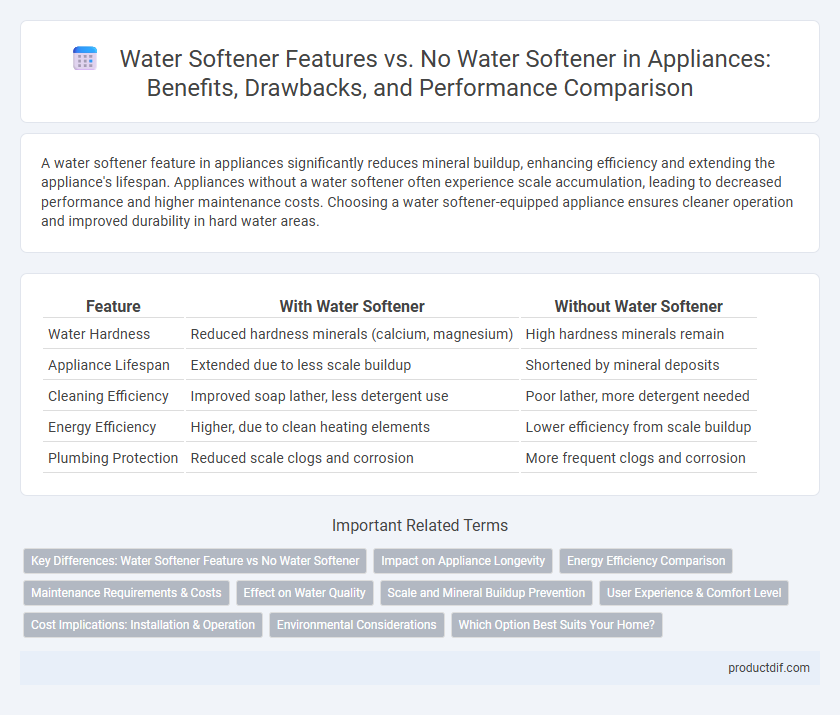A water softener feature in appliances significantly reduces mineral buildup, enhancing efficiency and extending the appliance's lifespan. Appliances without a water softener often experience scale accumulation, leading to decreased performance and higher maintenance costs. Choosing a water softener-equipped appliance ensures cleaner operation and improved durability in hard water areas.
Table of Comparison
| Feature | With Water Softener | Without Water Softener |
|---|---|---|
| Water Hardness | Reduced hardness minerals (calcium, magnesium) | High hardness minerals remain |
| Appliance Lifespan | Extended due to less scale buildup | Shortened by mineral deposits |
| Cleaning Efficiency | Improved soap lather, less detergent use | Poor lather, more detergent needed |
| Energy Efficiency | Higher, due to clean heating elements | Lower efficiency from scale buildup |
| Plumbing Protection | Reduced scale clogs and corrosion | More frequent clogs and corrosion |
Key Differences: Water Softener Feature vs No Water Softener
Water softeners prevent mineral buildup by removing calcium and magnesium from hard water, enhancing appliance longevity and efficiency. Without a water softener, appliances may experience scaling, reduced performance, and higher energy consumption due to mineral deposits. Choosing a water softener-equipped appliance reduces maintenance costs and improves water quality for household use.
Impact on Appliance Longevity
Water softeners significantly extend appliance longevity by reducing mineral buildup that causes scaling and damage to internal components. Appliances without water softeners face increased risks of clogging, corrosion, and decreased efficiency due to hard water deposits. Utilizing a water softener improves durability and reduces maintenance costs over time, preserving appliance functionality.
Energy Efficiency Comparison
Water softeners significantly improve energy efficiency by preventing limescale buildup in water heaters and appliances, which reduces heat transfer and lowers energy consumption. Appliances without water softeners experience increased mineral deposits that lead to higher energy usage and shorter equipment lifespan. Energy savings of up to 29% can be achieved with softened water, making water softeners a cost-effective solution for reducing utility bills and enhancing appliance performance.
Maintenance Requirements & Costs
Water softeners reduce scale buildup in appliances, leading to lower maintenance frequency and prolonged lifespan. Without a water softener, mineral deposits accumulate faster, increasing cleaning efforts and repair costs. Investing in a water softener can minimize costly descaling and extend appliance durability.
Effect on Water Quality
Water softeners significantly reduce calcium and magnesium ions that cause hardness, resulting in smoother water and less scale buildup in pipes and appliances. Without a water softener, hard water can lead to mineral deposits, reducing water quality and causing damage to plumbing systems. Softened water improves detergent effectiveness and enhances the overall taste and appearance of the water.
Scale and Mineral Buildup Prevention
Water softeners reduce scale and mineral buildup by removing calcium and magnesium ions from hard water, preventing damage to appliances such as dishwashers, washing machines, and water heaters. Without a water softener, mineral deposits accumulate over time, decreasing appliance efficiency and lifespan while increasing maintenance costs. Using a water softener improves appliance performance, lowers energy consumption, and extends the operational life by protecting internal components from scale formation.
User Experience & Comfort Level
Water softeners enhance user experience by reducing mineral buildup, preventing appliance wear and improving water quality for softer skin and hair. Without a water softener, hard water causes scale deposits, leading to less efficient appliances and rougher skin sensations. Choosing a water softener ensures comfort and appliance longevity by maintaining optimal water softness throughout daily use.
Cost Implications: Installation & Operation
Installing a water softener increases initial appliance costs by $500 to $1,500, but reduces long-term expenses due to less mineral buildup and fewer repairs. Operating costs rise with salt and electricity consumption, averaging $100 to $200 annually, yet savings on plumbing maintenance and appliance lifespan often offset these expenditures. Appliances without water softeners face higher risks of scale damage, leading to increased repair costs and shorter replacement cycles.
Environmental Considerations
Water softeners reduce scale buildup in appliances by removing calcium and magnesium ions, which improves energy efficiency and prolongs appliance lifespan. Appliances without water softeners experience more frequent maintenance and higher energy consumption due to mineral deposits. Utilizing a water softener limits the environmental impact by decreasing the need for harsh chemical cleaners and reducing water waste through fewer repair cycles.
Which Option Best Suits Your Home?
Homes with hard water benefit significantly from a water softener, which reduces mineral buildup, improves appliance longevity, and enhances water quality for cleaning and bathing. Without a water softener, appliances like dishwashers and washing machines may experience scaling, leading to increased maintenance costs and reduced efficiency. Choosing a water softener is ideal for households facing hard water issues, while homes with naturally soft water may not require this feature.
Water Softener Feature vs No Water Softener Infographic

 productdif.com
productdif.com